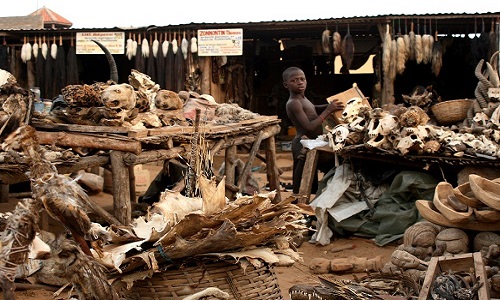7,421 total views, 2 views today
Sacrifices and rituals used to be founded in traditional religion. Literally, sacrifice is an act where a gift is being giving to a person to show appreciation and to expect something greater. Sacrifice, in this context is an act of offering or giving a gift to a deity, a god or to a supernatural being as a form of religious purpose. This serves as a form of prayer to seek forgiveness, blessing, harvest, protection or to cleanse the land if any atrocity was committed. Sacrifices offered could be in form of food items, material gifts, animal or man.
Food can be cooked and served in calabashes. These foods differ according to the favourite meal of the deity. Common ones include cornmeal and palm oil, bean cake, kola nut, boiled egg, pottage and others. Fresh fruits are also offered in form of food offerings. Examples of animals used for sacrificial ritual are goats, sheep, fowls, pigeons among others. Most of these animals are first slaughtered before they are used.
Any sacrifice that involves spilling of blood is known as rituals. Animals and man can be used for rituals. Appeal to the gods of the land with sacrificial rituals occurs in few cases and in serious situations. The use of animals or human being for rituals should be the best of their kinds. An healthy animal or being is usually sacrificed. In some places, strangers, children, handicapped, physically challenged, twins, albinos, people with hunch back are used as sacrificial items. This practice was common in the olden days and still in practice in few towns and small villages.
According to the tradition in some places, the kings and traditional rulers are sometimes buried with a person or people. These people that are buried with the traditional rulers could be the loyal servants, wives or concubines, who are believed to see the king off to the afterlife and also for them to continue their service. European’s invasion and the coming of other religions have brought a decline in this practice.
In traditional medicine, the practitioners, usually the diviner can prescribe sacrifice or rituals as the solution to a problem. The sacrificial items are mostly prescribed by the gods or the priests. Food or gift sacrifices are carried by the person or by the family members of the person seeking solutions to a particular problem. In rare cases, the bearer of the sacrifice is the traditional priest(s). The sacrifices could be dropped at T-junction, river banks, on the mountains.
Furthermore, there are many beliefs that people must adhered to when it comes to sacrifices and ritual offerings. For example, a woman must not witness the period when sacrifices are being made. It is also risky for a pregnant woman or to be the first person to sight a sacrifice.
The animals or man could be buried alive or dead. Some are killed and their blood is being spilled on the gods after which the dead body will be disposed of. Normally, the bearer of the sacrifice does not always look back after dropping the sacrificial item. Deviating from this is believed to have negative repercussion and can lead to the sacrifice not acceptable. This practice was common in the olden days and still in practice in few towns and small villages.
Some wicked and lazy people, who want to be wealthy without much work, now engage in rituals and killing of innocent souls. They kidnap both the normal and the special people and kill them to make quick money. The killing of innocent souls should be stopped and anyone caught in this act should be punished under the law.
